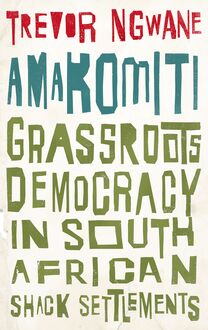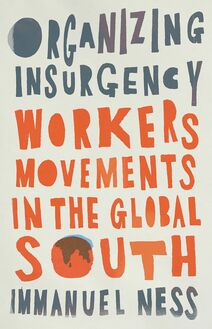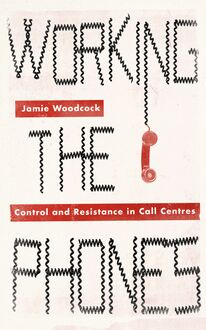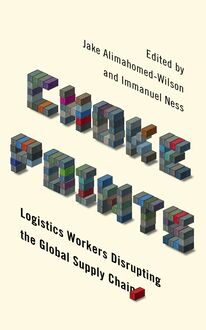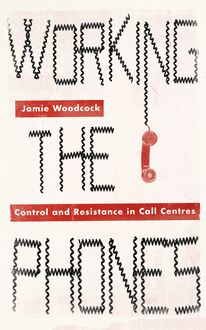Augmented Exploitation , livre ebook
127
pages
English
Ebooks
2021
Vous pourrez modifier la taille du texte de cet ouvrage
Obtenez un accès à la bibliothèque pour le consulter en ligne En savoir plus
Découvre YouScribe en t'inscrivant gratuitement
Découvre YouScribe en t'inscrivant gratuitement
127
pages
English
Ebooks
2021
Vous pourrez modifier la taille du texte de cet ouvrage
Obtenez un accès à la bibliothèque pour le consulter en ligne En savoir plus
Publié par
Date de parution
20 mars 2021
Nombre de lectures
1
EAN13
9780745343518
Langue
English
Artificial Intelligence is a seemingly neutral technology, but it is increasingly used to manage workforces and make decisions to hire and fire employees. Its proliferation in the workplace gives the impression of a fairer, more efficient system of management. A machine can't discriminate, after all.
Augmented Exploitation explores the reality of the impact of AI on workers' lives. While the consensus is that AI is a completely new way of managing a workplace, the authors show that, on the contrary, AI is used as most technologies are used under capitalism: as a smokescreen that hides the deep exploitation of workers.
Going beyond platform work and the gig economy, the authors explore emerging forms of algorithmic governance and AI-augmented apps that have been developed to utilise innovative ways to collect data about workers and consumers, as well as to keep wages and worker representation under control. They also show that workers are not taking this lying down, providing case studies of new and exciting form of resistance that are springing up across the globe.
Figures
Series Preface
Acknowledgements
Introduction: AI: Making it, Faking it, Breaking it - Phoebe V. Moore and Jamie Woodcock
PART I - MAKING IT
1. AI Trainers: Who is the Smart Worker Today? - Phoebe V. Moore
2. Work Now, Profit Later: AI Between Capital, Labour and Regulation - Toni Prug and Paško Bilić
3. Delivering Food on Bikes: Between Machinic Subordination and Autonomy in the Algorithmic Workplace - Benjamin Herr
4. Putting the Habitus to Work: Digital Prosumption, Surveillance and Distinction - Eduard Müller
5. The Power of Prediction: People Analytics at Work - Uwe Vormbusch and Peter Kels
PART II - FAKING IT
6. Manufacturing Consent in the Gig Economy - Luca Perrig
7. Automated and Autonomous? Technologies Mediating the Exertion and Perception of Labour Control - Beatriz Casas González
8. Can Robots Produce Customer Confidence? Contradictions Among Automation, New Mechanisms of Control and Resistances in the Banking Labour Process - Giorgio Boccardo
PART III - BREAKING IT
9. It Gets Better With Age: AI and the Labour Process in Old and New Gig-Economy Firms - Adam Badger
10. Self-Tracking and Sousveillance at Work: Insights from Human-Computer Interaction and Social Science - Marta E. Cecchinato, Sandy J. J. Gould and Frederick Harry Pitts
11. Breaking Digital Atomisation: Resistant Cultures of Solidarity in Platform-Based Courier Work - Heiner Heiland and Simon Schaupp
12. Resisting the Algorithmic Boss: Guessing, Gaming, Reframing and Contesting Rules in App-Based Management - Joanna Bronowicka and Mirela Ivanova
Notes on Contributors
Index
Publié par
Date de parution
20 mars 2021
Nombre de lectures
1
EAN13
9780745343518
Langue
English
Augmented Exploitation
Wildcat: Workers Movements and Global Capitalism
Series Editors:
Immanuel Ness (City University of New York)
Peter Cole (Western Illinois University)
Raquel Varela (Instituto de Hist ria Contempor nea [IHC] of Universidade Nova de Lisboa, Lisbon New University)
Tim Pringle (SOAS, University of London)
Also available:
The Cost of Free Shipping:
Amazon in the Global Economy
Edited by Jake Alimahomed-Wilson and Ellen Reese
Choke Points:
Logistics Workers Disrupting the Global Supply Chain
Edited by Jake Alimahomed-Wilson and Immanuel Ness
Dying for an iPhone:
Apple, Foxconn and the Lives of China s Workers
Jenny Chan, Mark Selden and Pun Ngai
Just Work?
Migrant Workers Struggles Today
Edited by Aziz Choudry and Mondli Hlatshwayo
Wobblies of the World:
A Global History of the IWW
Edited by Peter Cole, David Struthers and Kenyon Zimmer
Organizing Insurgency:
Workers Movements in the Global South
Immanuel Ness
Southern Insurgency:
The Coming of the Global Working Class
Immanuel Ness
Amakomiti:
Grassroots Democracy in South African Shack Settlements
Trevor Ngwane
Workers Inquiry and Global Class Struggle: Strategies, Tactics, Objectives
Edited by Robert Ovetz
The Spirit of Marikana:
The Rise of Insurgent Trade Unionism in South Africa
Luke Sinwell with Siphiwe Mbatha
Solidarity:
Latin America and the US Left in the Era of Human Rights
Steve Striffler
Working the Phones:
Control and Resistance in Call Centres
Jamie Woodcock
Augmented Exploitation
Artificial Intelligence, Automation and Work
Edited by Phoebe V. Moore and Jamie Woodcock
First published 2021 by Pluto Press
345 Archway Road, London N6 5AA
www.plutobooks.com
Copyright Phoebe V. Moore and Jamie Woodcock 2021
The right of the individual contributors to be identified as the authors of this work has been asserted in accordance with the Copyright Designs and Patents Act 1988
British Library Cataloguing in Publication Data
A catalogue record for this book is available from the British Library
ISBN 978 0 7453 4350 1 Hardback
ISBN 978 0 7453 4349 5 Paperback
ISBN 978 0 7453 4353 2 PDF eBook
ISBN 978 0 7453 4352 5 Kindle eBook
ISBN 978 0 7453 4351 8 EPUB eBook
This book is printed on paper suitable for recycling and made from fully managed and sustained forest sources. Logging, pulping and manufacturing processes are expected to conform to the environmental standards of the country of origin.
Typeset by Stanford DTP Services, Northampton, England
Simultaneously printed in the United Kingdom and United States of America
Contents
Figures
Series Preface
Acknowledgements
Introduction: AI: Making it, Faking it, Breaking it
Phoebe V. Moore and Jamie Woodcock
PART I MAKING IT
1 AI Trainers: Who is the Smart Worker Today?
Phoebe V. Moore
2 Work Now, Profit Later: AI Between Capital, Labour and Regulation
Toni Prug and Pa ko Bili
3 Delivering Food on Bikes: Between Machinic Subordination and Autonomy in the Algorithmic Workplace
Benjamin Herr
4 Putting the Habitus to Work: Digital Prosumption, Surveillance and Distinction
Eduard M ller
5 The Power of Prediction: People Analytics at Work
Uwe Vormbusch and Peter Kels
PART II FAKING IT
6 Manufacturing Consent in the Gig Economy
Luca Perrig
7 Automated and Autonomous? Technologies Mediating the Exertion and Perception of Labour Control
Beatriz Casas Gonz lez
8 Can Robots Produce Customer Confidence? Contradictions Among Automation, New Mechanisms of Control and Resistances in the Banking Labour Process
Giorgio Boccardo
PART III BREAKING IT
9 It Gets Better With Age: AI and the Labour Process in Old and New Gig-Economy Firms
Adam Badger
10 Self-Tracking and Sousveillance at Work: Insights from Human-Computer Interaction and Social Science
Marta E. Cecchinato, Sandy J. J. Gould and Frederick Harry Pitts
11 Breaking Digital Atomisation: Resistant Cultures of Solidarity in Platform-Based Courier Work
Heiner Heiland and Simon Schaupp
12 Resisting the Algorithmic Boss: Guessing, Gaming, Reframing and Contesting Rules in App-Based Management
Joanna Bronowicka and Mirela Ivanova
Notes on Contributors
Index
Figures
6.1 Gamification Devices: Rankings And Bonuses
6.2 Information Available Before Accepting a Job Offer
8.1 Banking Employees (2005-18)
8.2 Banking Offices (2005-19)
8.3 Organogram of Automation and Banking Labour Process
11.1 How Often Do You Interact With Other Drivers While Working?
Series Preface
Workers movements are a common and recurring feature in contemporary capitalism. The same militancy that inspired the mass labour movements of the twentieth century continues to define worker struggles that proliferate throughout the world today.
For more than a century, labour unions have mobilised to represent the political-economic interests of workers by uncovering the abuses of capitalism, establishing wage standards, improving oppressive working conditions, and bargaining with employers and the state. Since the 1970s, organised labour has declined in size and influence as the global power and influence of capital has expanded dramatically. The world over, existing unions are in a condition of fracture and turbulence in response to neoliberalism, financialisation, and the reappearance of rapacious forms of imperialism. New and modernised unions are adapting to conditions and creating a class-conscious workers movement rooted in militancy and solidarity. Ironically, while the power of organised labour contracts, working-class militancy and resistance persists and is growing in the Global South.
Wildcat publishes ambitious and innovative works on the history and political economy of workers movements and is a forum for debate on pivotal movements and labour struggles. The series applies a broad definition of the labour movement to include workers in and out of unions, and seeks works that examine proletarianisation and class formation; mass production; gender, affective and reproductive labour; imperialism and workers; syndicalism and independent unions, and labour and Leftist social and political movements.
Acknowledgements
Jamie Woodcock and Phoebe V. Moore would like to thank the organisers of the International Labour Process Conference (ILPC) 2019 in Vienna for accepting our stream on artificial intelligence and work. The contributors to this book presented in the stream, and we would like to acknowledge all of their efforts and contributions. A big thanks to David Shulman at Pluto for supporting the book idea, as well as to Robert Webb for guiding it through production. Each of the authors of the book were a pleasure to work with, particularly through the challenges of collecting final versions and changes through the Covid-19 pandemic.
When writing about work it is important to remember that there are already many people who keenly feel the effects of new technology in both recognised and unseen work. We therefore dedicate this book to all those workers finding new ways to make, fake, or break technology at work.
Phoebe V. Moore: I would like to acknowledge my mother Aureol for her steadfast support, and my father, Tom, for the same, over many years from PhD until now. My four brothers likewise, are continuously in my thoughts. I would also like to acknowledge Jamie Woodcock for being a very good co-organiser and co-editor.
Jamie Woodcock: I would like to thank my partner Lydia for her support throughout this project. I would also like to thank Phoebe V. Moore, both for coming up with the idea of an edited collection and for being a great collaborator and editor to work with.
Introduction AI: Making it, Faking it, Breaking it
Phoebe V. Moore and Jamie Woodcock
Technology has shaped and reshaped work in various ways throughout history. Digital technology is continuing to create widespread change across different kinds of work, a process that is set to intensify with the increasing use of artificial intelligence (AI) and automation. So far, there has been documented use of AI in the hiring, managing and firing of workers. Less understood are the effects of this on the labour process, workers and managers more broadly. Although platform work uses AI extensively to plan, manage and control workers, there is limited empirical research on how these processes operate in practice.
There are two main problems with how AI and automation are discussed today. The first is a sense that they are somehow new and unprecedented interventions into the labour process. Historically, the machine is an attempt to automate part of the labour process, increasing the amount produced by a worker. It has a significantly longer history than self-driving cars or automated warehouse pickers. This leads us to the second problem: there is often a binary understanding of automation, either something will be automated or not. This leads to a focus on the machine - how effective is the new self-driving vehicle, for example - rather than looking at how automation is actually affecting work and workers. Rather than an either/ or, automation is used much more as an augmentation of the labour process. While the word augmentation is often used to refer to improvement, the editors of this volume intend to challenge not only this definitional substance but the concept altogether. While automation and machinic augmentation can work to improve workers lives, in the context of neoliberal capitalism there is a broad assumption that technology will streamline work and make organisations more efficient, rather than an interrogation of the dangers and risks that accompany the processes outlined in the following chapters.
To address these challenges the contributions to this volume address the issues of AI, automation and work through three lines of analysis. First, we look at how AI is made , exploring how AI comes into being and how it is used, e.g., in human resource dec

